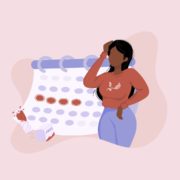To be, or not to be… mentally stable whilst due on my period?

Is the question every woman will ask themselves during the luteal phase of their menstrual cycle, right?
Contribution by Charissa Halsey.
Wrong. But if you do find yourself anxiously worrying about the effects your premenstrual symptoms (PMS) will have on your mental wellbeing this month, then it might be a bit more serious than just PMS alone. The disorder I’ll be shedding light on today is the hell-month beast known as Premenstrual Dysphoric Disorder – and it is not the same as PMS.
Premenstrual Dysphoric Disorder (most commonly known as PMDD) is a severe form of PMS. Women’s Health list the main symptoms accordingly as; severe irritability, depression or anxiety during the week or two before your period starts, which in extreme cases, can lead to irrational decision making based on feelings that although tend to be temporary, are very much present in the moment of affecting someone’s entire life. Women’s Health further concern ‘feeling out of control’ as one of the symptoms, and IAPMD mention that PMDD sufferers are at an increased risk of suicide and suicidal behaviours.
‘This is a disorder that can seriously affect lives all around us if we don’t know how to distinguish it from PMS or ‘women problems’ in general‘.
There is no directly understood cause of the health problem, but from the small (but nonetheless still very important) research that has been accomplished, it is believed to be heritable. It’s often mistyped as a hormone imbalance disorder – when it is actually understood to be a cellular disorder where the brain will have a severe negative reaction to the hormonal imbalance. As previously mentioned, there’s not a vast amount of research on the subject due to these topics generally being disregarded within health care, meaning that there isn’t a ton of information on how to ease the hard-hitting symptoms. But thanks to my own research and the extremely helpful r/PMDD subreddit, I’ve been able to research into the reality of how serious this disorder can be. Fellow PMDD sufferer, Annastasia (24), has kindly shared her battle with the illness, whilst voicing the difficulties that thousands of women have to deal with on a daily basis.
What were some methods that you had tried previously to ease your symptoms?
‘For 9 years I went misdiagnosed. First with depression when I was 13, and then with bipolar when I was 19. During those times I had tried over 14 different antidepressants. Multiple different antipsychotics and Lamictal…I was also going through therapy during that point too. I discovered I had PMDD during a psychology class, there was a tiny little paragraph about PMDD during our section on bipolar- it was talking about how some women have this instead of bipolar, and a lightbulb went off in my head. I did my own research online and realized my symptoms were tied to my periods, not random cycles like bipolar. I went to a gynaecological and a psychiatrist with this info and they both agreed I had PMDD. After that, I tried Prozac, which usually works quite a bit for most women, however, it didn’t do much for me. I also tried dietary restrictions, no salt, no sugar, no alcohol, no caffeine during my luteal phase… this also didn’t help much. I then tried continuous birth control (to stop my hormones from their natural cycles- the changing levels of hormones are a part is what causes PMDD) this worked pretty well but I could only do it for 4 months at a time before I would need to have a period again- In which case, all my progress would be lost and I would have symptoms again. I also tried various supplements and exercises before trying an IUD which was recommended by the doctor. However, there are no clinical studies that show these ease symptoms but actually do the opposite for many. This happened to me and my PMDD became much worse. After trying literally everything my doctor said I was a candidate for chemical menopause via a Lupron injection.
So far this has been the only thing that completely eases my symptoms. The sad part is that it’s not healthy to stay on for an extended period of time, it can cause osteoporosis and other health issues, like normal menopause. So I can only be on it for a couple of years before they surgically remove my ovaries and uterus.’
There’s been a lot of trial and error from women all over the world who have fought hard to tame their PMDD monsters. Some women (a 12.3% found in a study) have turned to artificial birth controls and medication to find that it makes their general PMS symptoms better- but many (a 16.3% in the same study) have found that it only makes them worse. So if you’re in the stance of avoiding that possibility of making PMDD symptoms worse (given they’re already so much worse), here are some natural methods I recommend:
- Herbal supplements: You can arrange a consultation with your local herbalist health practitioner, where they will completely break down your symptoms and determine the best ingredients to help prevent them.
- Regular exercise/mediation
- Dietary adjusting: Reducing sugar, salt, caffeine and alcohol intake and increasing protein intake etc.
Of course, there is no guarantee for these working. In some cases, like Annastasia’s, medicinal procedures from a doctor may work best for you. Please seek advice from a doctor if nothing improves.
So it’s one thing to be internally struggling whilst trying to deal with this disorder alongside processing it, but with trying to balance so much internally, it can be hard to externalise these feelings you can’t even fully comprehend yourself. This can be something that makes PMDD unbearable when trying to maintain any social life during the luteal phase – as all you want to do is shut yourself away from the rest of the world. It’s a disorder that’s not talked about all too often + therefore it seems like nobody is going to understand = it feels like nobody is going to be able to help you, so how do you express that to your loved ones?
Would you say your struggle with PMDD has been difficult in regards to maintaining relationships around you?
‘It most definitely has affected all of my personal relationships. As far as partners and family are concerned, it’s really hard for them to understand what exactly is happening to you, and they can’t keep track of your cycle like you’re (I) able to. So when you’re in the middle of PMDD symptoms, they might not know. You end up getting frustrated at really small things, picking fights, starting arguments, maybe you’re really emotional, and they won’t understand right away that it’s your PMDD causing this so they take it personally- as anyone would do. It’s hard enough on me to try and handle all the emotional swings, it’s even harder for the people around me who aren’t in my head and can’t really help or see what’s going on. I’ve had 4 relationships end because my PMDD was too much for them to handle.’
One of the most important factors of dealing with PMDD, is being communicative with the people that may also be affected by it around you. But sometimes, as we’ve already touched upon, it’s difficult to express exactly what you’re feeling out loud to loved ones in your life whilst dealing with symptoms.
If you aren’t personally affected by this disorder but have somebody close in your life that is, then a great way to help is to also keep track of their cycle to understand that it’s not personal- it’s PMDD. There are apps such as Hormonology and Flo, which are designed to keep track of someone’s menstrual cycle.
Have you found that you’ve been supported emotionally throughout this complicated process? From friends, family etc.?
‘I have some amazing friends that have helped along and mostly supportive family, it’s hard for people to be able to completely understand though’
And in terms of being supported/supportive through PMDD, the truth is…
All you can do is be there for them. At the end of the day, you can’t force happiness upon someone – especially if it’s someone that has a genuine negative reaction in the brain caused by a hormonal imbalance. Communication and patience between both parties are going to be so incredibly important when trying to express how you’re both feeling. Without that, you’re going to struggle through a process that can already be so hard for any member of a relationship fighting something so obnoxious.
When PMDD starts interfering with your life so drastically, you become so desperate to find the cure to live a normal life again. Bringing awareness and educating communities of this disorder is the next step to helping women, who may not even realise they have it yet, take their steps to start living a positive life again by understanding the disorder, together.
Contribution by Charissa Halsey.
Check out the GUAP Arts & Culture section, to discover new art, film, and creative individuals.

